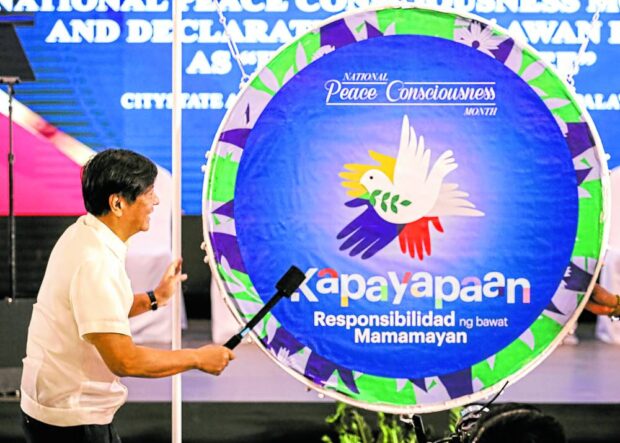
BUILDING PEACE President Marcos on Friday leads the official
declaration of Palawan as an insurgency-free province in a
programmarking the National Peace Consciousness Month in
Puerto Princesa City. —PHILIPPINE NEWS AGENCY
PUERTO PRINCESA CITY—President Marcos officially declared the province of Palawan free from communist insurgency on Friday, a status that officials believed could boost the province’s economy and tourism.
The President made the declaration as he led the celebration of National Peace Consciousness Month in this capital city, citing a joint resolution by the Palawan Provincial Task Force to End Local Communist Armed Conflict (PTF-Elcac) and the Provincial Peace and Order Council (PPOC) in 2022.
Marcos said this was a result of collaboration among government agencies, local communities, the private sector and other groups which he described as key to the success of the campaign to rid the province of communist rebels.
“I recognize the supportive and collaborative efforts of the regional and provincial task force Elcac, the [PPOC], and its partner agencies among the people of the province for the successful implementation of the whole-of-nation approach to local communist armed conflict, which has led to this insurgency-free status for Palawan,” he said in his speech.
He added: “This milestone that we celebrate today epitomizes your commitment to putting an end to the decades-long insurgency in the area through the provision of national reintegration programs for former rebels and promotion of the island’s peace and security.”
Speaking to reporters later, the President said tourists had been discouraged from visiting the Philippines because of the country’s decades-long insurgency problem.
“That is the problem that we are slowly solving now,” he said. “Unless you have a peaceful community, unless you have security in the area, it is really hard to attract investments.”
“And so now that we are able to wave that flag, we can say: ‘No, Palawan is free,’” he added.
Palawan, he said, is “a very large part” of the country’s economic transformation due to its vibrant tourism industry.
Palawan was first declared an insurgency-free province through a joint resolution adopted by the PPOC and PTF-Elcac in December 2022.
PPOC and PTF-Elcac noted in the resolution that with the implementation of Executive Order No. 70, signed by then President Rodrigo Duterte and which created the NTF-Elcac, rebel groups in the province were “decimated” either with the voluntary surrender of its members or “neutralization” by a focused military operation of the Western Command (Wescom).
Attracting investors
“This [declaration] will boost our economy as it will surely attract more investors to come to the province, and our tourism sector will likewise benefit as more tourists will surely come,” said Gov. Victorino Dennis Socrates.
Puerto Princesa Mayor Lucilo Bayron said most of the city government’s programs also focused on bringing government services closer to the people with the establishment of satellite offices in strategic areas of the city.
“We brought the government closer to the people through the establishment of government facilities in our northeast, northwest, southeast and southwest rural barangays—mini city halls, enhanced satellite clinics, additional police stations, and continuous construction and concreting of roads that lead to areas previously unreachable or isolated,” Bayron said during the program.
“This is Puerto Princesa’s recipe for peace and progress that makes us confident of the support and trust of the people in the government,” he said.
In a recent interview, Wescom chief Vice Adm. Alberto Carlos recalled that, based on the command’s records, the activities of the New People’s Army (NPA) in Palawan started in 1981 after the Panay Island Regional Party Committee group began mass organizing efforts in the cluster of remote villages in Narra and Aborlan in southern Palawan.
Carlos said the NPA eventually established its umbrella front chapters in 1985, with constant monitoring and guidance from the Bicol Regional Party Committee of the Southern Luzon Commission.
The communist insurgency in the province had its strongest force in 1991 with the establishment of the Komite Sub-Distrito under the Mindoro Island Party Committee as the highest governing body, overseeing the group’s operations throughout the province, which included the towns of Roxas and San Vicente in northern Palawan.
The rebel group was dismantled the following year as a result of Wescom’s intensified military operations, which also weakened the rebels’ expansion activities in the province, before regaining their strength in 1996 when new members from Mindoro island came in and spread out into three groups.
Quezon ambush
But while Marcos was hoping that Palawan’s insurgency-free status would be replicated in other provinces, at least five members of the Citizen Armed Forces Geographical Unit (Cafgu) were killed while two Army soldiers were wounded when they were attacked by communist rebels in Quezon province on Friday.
Army Col. Dennis Cana, public information officer of the military’s Southern Luzon Command, said troops from the Army’s 85th Infantry Battalion were patrolling the boundary of Tagkawayan, Quezon, and Labo, Camarines Norte, at 11 a.m. when one of the Cafgu members stepped on an explosive device set up by NPA rebels reportedly operating in nearby Bicol region.
Police Col. Ledon Monte, Quezon provincial police chief, said the soldiers and Cafgu members were stationed in the subvillage of Pagasa in Tagkawayan’s Barangay Mapulot.
“It was a direct hit. There were casualties,” Monte said in a phone interview.

